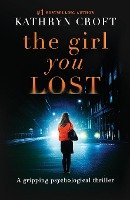Eighteen years ago your baby daughter was snatched. Today, she came back. A sinister and darkly compelling psychological thriller from the No.1 bestselling author of The Girl With No Past. Eighteen years ago, Simone Porter's six-month-old daughter, Helena, was abducted. Simone and husband, Matt, have slowly rebuilt their shattered lives, but the pain at losing their child has never left them. Then a young woman, Grace, appears out of the blue and tells Simone she has information about her stolen baby. But just who is Grace - and can Simone trust her? When Grace herself disappears, Simone becomes embroiled in a desperate search for her baby and the woman who has vital clues about her whereabouts. Simone is inching closer to the truth but it'll take her into dangerous and disturbing territory. Simone lost her baby. Will she lose her life trying to find her?

